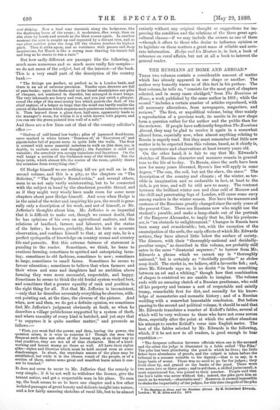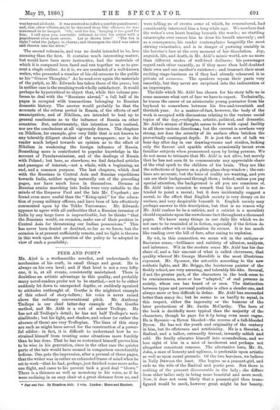THE RUSSIANS AT HOME AND ABROAD.* THESE two volumes contain
a considerable amount of matter which has already appeared in one shape or another. The author very honestly warns us of this fact in his preface. The first volume, he tells us, "consists for the most part of chapters selected, and in many cases abridged," from The Russians at Home, a work published by the same author in 1861; while the second "includes a certain number of articles reproduced, with all necessary alterations, from newspapers, magazines, and reviews." The first, or unpolitical volume, being thus mainly a reproduction of a previous work, its merits in its new shape form a question rather for the author and the public than for the reviewer. If people have sufficiently forgotten The Russians Abroad, they may be glad to receive it again in a somewhat altered form, especially now, when almost anything relating to Russia is eagerly read. But they must remember that little new matter is to be expected from this volume, based, as it chiefly is, upon experience and observations at least twenty years old.
On the other hand, it is fair to say that Mr. Edwards's sketches of Russian character and manners remain in general true to the life of to-day. To Russia, since the serfs have been now for many years liberated, Byron's line will apply in some degree, "The sun, the soil, but not the slave, the same." The description of the country and climate ; of the winter, so ter- rible in imagination and so endurable in fact, at least to the rich, is yet true, and will be still new. to many. The contrast between the brilliant winter sun and clear cold of Moscow and the chill and penetrating fogs of London, will cause some envy among readers in the winter season. Nor have the manners and customs of the Russians greatly changed since the early years of the present Czar. There are Russians now who might use the student's parable, and make a lamp-shade out of the portrait of the Emperor Alexander, to imply that he, like his predeces- sor, is "an obstacle to enlightenment." Changes in Russia have been many and considerable ; but, with the exception of the emancipation of the serfs, the early effects of which Mr. Edwards notices, they have altered little below the surface of society.
The dinners, with their "thoroughly-national and decidedly- peculiar soups," as described in this volume, are probably still eaten in the same " dinatorial sequence ;" to borrow from Mr. Edwards a phrase which we cannot say is "thoroughly national," but is certainly as "decidedly peculiar" as sh,chee soup itself. The sterlet is, we believe, still a favourite fish ; and, since Mr. Edwards says so, is no doubt "in form something between an. eel and a whiting," though how that combination of shapes is contrived we are unable to imagine. The volume ends with an amusing sketch of a Russian gentleman, who sold all his property and became a sort of respectable and saintly tramp, remarkable first for dirt, and secondly for his know- ledge of monasteries and monastic history; and of a Russian wedding with a somewhat lamentable conclusion. But before passing to the second and political volume, it should be said that Mr. Edwards translates a number of Kriloff's fables, several of which will be very welcome to those who have not come across them, especially after the point at which the author abandons his attempt to render Kriloff's verse into English metre. The best of the fables selected by Mr. Edwards is the following, which, if it be not new to all readers, is good enough to bear repetition :—
"The frequent collusion between officials when one is the accused and the other the judge is illustrated in a fable called The Pike.' The pike has been plundering the pond in which he lives; • the little fishes have abundance of proofs, and the culprit is taken before the tribunal in a manner suitable to his dignity,—that is to say, in a large basin of water. There was no need to go far for judges ; they lived close by, and grazed on the banks of the pond. There were two asses, two or three goats ; and to aid them, a skilled jurisconsult, a most experienced fox, was joined to their number. People said that the fox's table was never without fish ; indeed, the pike gave him as much as he wanted,—charitable soul ! However, it seemed impossible to shake the impartiality of the judges, for this time the guilt of the pike • The Russians at Home and the Russians Abroad. By H. Sutherland Edwards. London W. H. Allen and 00. 1875. was beyond all doubt. It was resolved to inflict a terrible punishment ; and, that other villains might be deterred from like offences, he was sentenced to be hanged. Oh,' said the fox, hanging is too good for him. I call upon you, venerable tribunal, to visit his crime with a punishment even more severe. Let us drown him!' ' The fox is right !' cried the judges, in chorus ; and thereupon the thief was taken and thrown into the river."
The second volume is, and was no doubt intended to be, less amusing than the first. It contains much interesting matter, but would have been more instructive, had the materials of which it is composed been fused and ran together so as to pre- sent a single outline. As it is, we are reminded of a well-known writer, who presented a number of his old sermons to the public as his" Graver Thoughts." As he used over again the materials of the pulpit, so Mr. Edwards has taken those of the press; but in neither case is the resulting work wholly satisfactory. It would perhaps be hypercritical to object that, while this volume pro- fesses to deal with the "Russians abroad," a full half of its pages is occupied with transactions belonging to Russian domestic history. The answer would probably be that the accounts of the reform period in Russia, of the effects of serf emancipation, and of Nihilism, are intended to lead up to general conclusions as to the influence of Russia on other countries. But, unfortunately, this intention is not realised, nor are the conclusions at all vigorously drawn. The chapters on Nihilism, for example, give very little that is not known to any tolerably diligent student of the newspapers; nor is the reader much helped towards an opinion as to the effect of Nihilism in weakening the foreign influence of Russia. Something more is contributed to popular knowledge in the account of Panslavonianism, and of the dealings of Russia with Poland; but here, as elsewhere, we find detached articles and passages of interest,—not a whole, with a beginning, an end, and a common purpose. The last chapters, which deal with the Russians in Central Asia and Russian expeditions towards India, neither spring naturally out of the preceding pages, nor have much force in themselves. Dreams of Russian armies marching into India were very suitable to the minds of the Emperor Paul and the late Mr. Urquhart; are found even more useful than the " Krieg-spiel " for the educa- tion of young military officers, and have been of late effectively commented upon by the Tekke Turcomans. Mr. Edwards appears to agree with all authorities that a Russian invasion of India by any large force is impracticable, but he thinks "that the Russians would, on occasion, make use of their position in Central Asia for threatening our Indian possessions." This has never been denied or doubted, so far as we know, but the occasion is at present sufficiently remote, and no light is thrown in this work upon the question of the policy to be adopted in view of such a possibility.



































 Previous page
Previous page